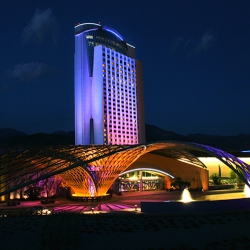PokerStars is working with the Morongo Band of Mission Indians to operate an online poker site with a California license, along with the 3 largest private card rooms in the state. Such a card room would require the state’s lawmakers to legalize online poker in the state, much as New Jersey, Delaware, and Nevada already have.
The three card rooms involved in negotiations are the Commerce Club in Los Angeles, the Bicycle Casino, and the Hawaiian Gardens Casino. Negotiations between the various gaming entities leaked out in March 2014, so rumors have circulated for some time about the deal. On Wednesday, official word was announced about the agreement. The announcement is said to have been timed to coincide with a hearing held by the California Assembly’s Committee on Government Organization. The topic of the hearing was intrastate online poker laws in California.
Bad Actor Clauses Could Hold up New Laws
The biggest obstacle remaining at the moment to the passage of a law in California is whether the legislation will contain “bad actor clauses” which would ban certain gaming companies. The “bad actor” is defined as a company which operated in the United States after the Unlawful Internet Gambling Enforcement Act of 2006, as PokerStars did. Two separate bills are in the California legislature, but only one of them at present has a bad actor clause. If such stipulations were made, then those who defied the UIGEA would not be able to secure a license for a online poker site.
PokerStars may face an uphill legislative battle, because most Native American tribal casino operators in the state support the bad actor clauses. If PokerStars entered the California market, these tribal casinos feel like their own prospective websites would have a hard time gaining signups. PokerStars is the largest poker room on the Internet, and had a loyal following of US players before the Black Friday incident, in which the U.S. Department of Justice seized Rational Group (PokerStars) assets and seized their domain.
PokerStars Banned by New Jersey and Nevada
At present, PokerStars is dealing with a 2-year suspension from licensed online gambling in the State of New Jersey. It was announced in summer 2013 that PokerStars would partner with Resorts Casino in Atlantic City on a New Jersey online poker site–a partnership which could have challenged Borgata and Caesars in the New Jersey market. The suspension does not mean PokerStars has been denied a license, but the license process was suspended for up to 2 years.
It is speculated the Division of Gaming Enforcement in New Jersey made the unprecedented ruling because it did not want to deny the Rational Group license, but did not want to approve a company which is still having issues with the Department of Justice. Their announcement stated they could proceed with the licensing if one of two things happened: either PokerStars settled its case with the Justice Department or “certain executives” left PokerStars. One particular PokerStars executive has never settled his own legal status with the U.S. government.
Nevada used “bad actor” legislation to do as New Jersey has done in keeping PokerStars out of their state, which led the Rational Group to try all-the-harder in California.
Native Americans Debate before the Committee
The situation appears more complicated in California than in New Jersey. The Native American tribes represent a powerful interest group in the Californian gaming sector, so they have the money and influence to affect legislative decisions in the state.
That makes the partnership with the Morongo Band of Mission Indians important. At the hearing this past week, Morongo Indians Tribal chairman Robert Martin testified before the committee that barring PokerStars would be a bad precedent–and a decision which would limit the online gaming sector of California.
Representatives from the Pechanga Band of Luiseno Indians, the United Auburn Indian Community, and other California Tribal interests took the other side of the issue. These people testified that maintaining the “integrity” of the gaming industry in California was important. Though these tribal representatives never mentioned PokerStars by name, most of them referred obliquely to the online poker room.
Moronga Band of Mission Indians Statement
After the meeting, Robert Martin issued a statement which said, “Efforts by a select few interests to rewrite longstanding and effective policy in order to gain a competitive market advantage or to lock out specific companies is not in the best interests of consumers or the state and will be vigorously opposed by our coalition, online poker players and many others.“

